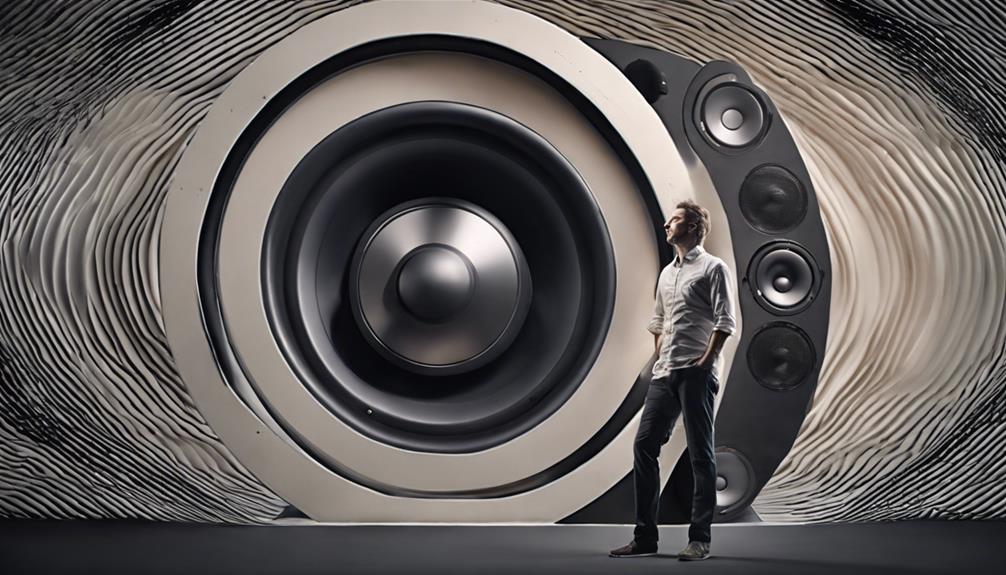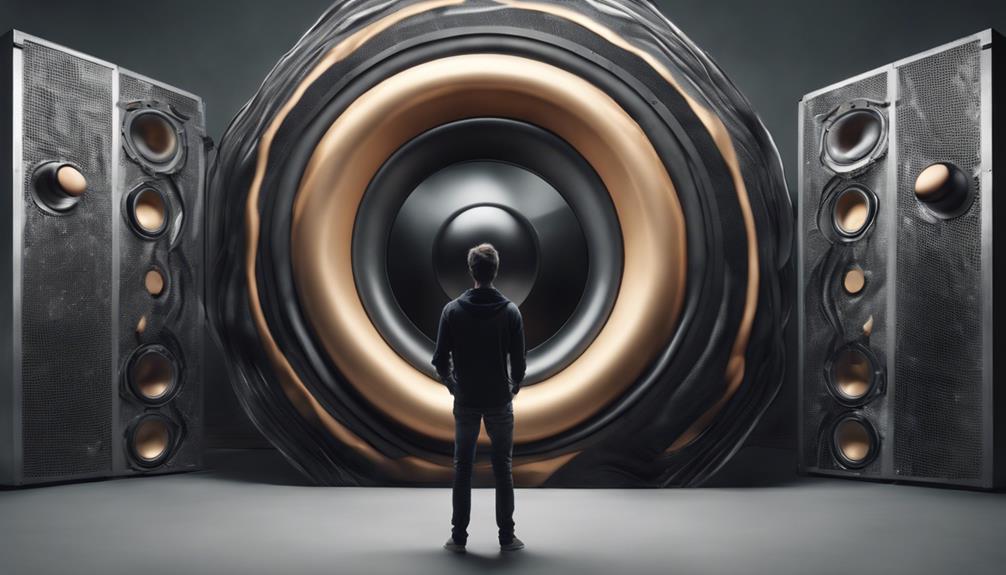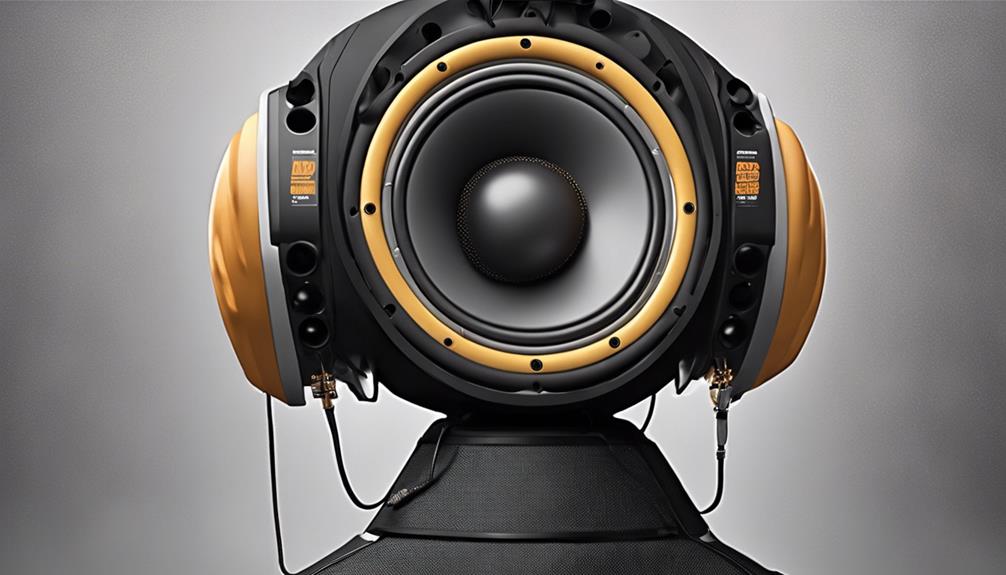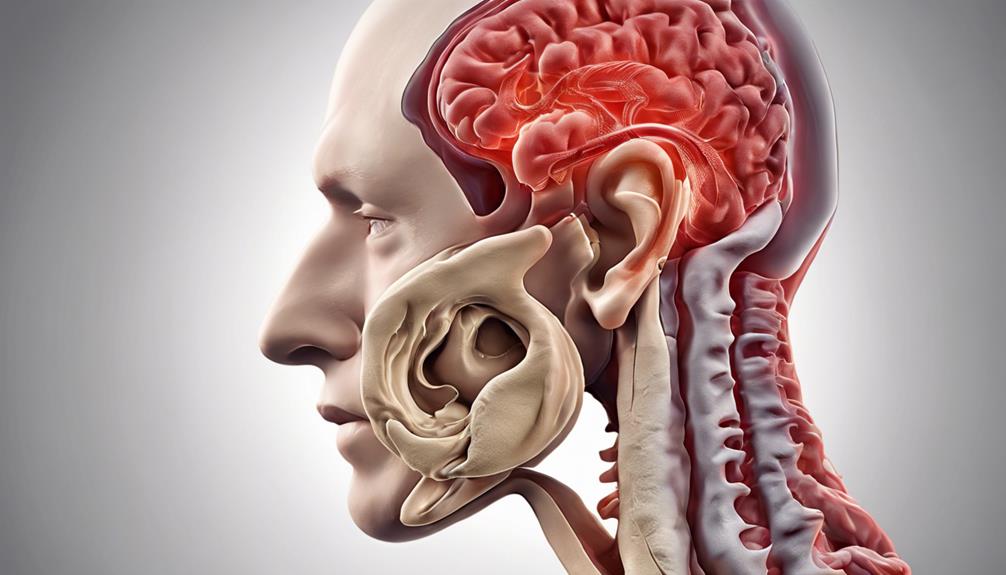While some may argue that enjoying deep bass sounds is harmless, it is important to consider the potential impact on our hearing health.
Have you ever wondered if that powerful bass at concerts or in your car could be affecting your ears more than you realize?
Let's explore the connection between strong bass and hearing loss to uncover the truth behind this common concern.
Key Takeaways
- Strong bass can damage inner ear hair cells, leading to hearing loss.
- Exposure to loud bass over time can cause sensorineural hearing loss.
- Utilizing ear protection and monitoring bass exposure are crucial for hearing health.
- Prolonged exposure to strong bass can result in irreversible hearing damage.

Hearprotek Concert Ear Plugs, 2Pairs Reusable high Fidelity Musician Ear Plugs for Concerts Loud Music-Noise Reduction Ear Protection earplugs for Rave,Festival,Music,Tinnitus Relief
High Fidelity: Hearprotek Music ear plugs do an effective job of bringing down the overall volume, blocking background…
As an affiliate, we earn on qualifying purchases.
As an affiliate, we earn on qualifying purchases.
The Science of Hearing Loss and Bass
We must understand the intricate relationship between strong bass frequencies and potential hearing loss to effectively protect our auditory health.
The damaging effects of loud bass sounds on our ears stem from the low-frequency nature of bass. These low-frequency sounds, often present in music and other sources, can cause harm to the delicate structures within our ears, particularly the hair cells in the cochlea.
Continuous exposure to intense bass frequencies can lead to sensorineural hearing loss, a type of hearing impairment that affects the nerves responsible for transmitting sound signals to the brain. This damage is cumulative, meaning that repeated exposure to strong bass sounds can exacerbate the issue over time.
To mitigate the risk of hearing damage from bass frequencies, it's crucial to employ ear protection when in high bass environments and to prioritize regular check-ups with audiologists for personalized guidance on preserving our hearing health.

ProCase Noise Reduction Ear Muffs, Sound Proof Ear Protection, NRR 28dB Noise Cancelling Headphones for Adults Kids Autism, Hearing Protection for Shooting Gun Range Mowing -Red
Constructed by solid ABS shell and thickened foam, the ear muffs achieve NRR 28 dB (SNR 34 dB)…
As an affiliate, we earn on qualifying purchases.
As an affiliate, we earn on qualifying purchases.
Effects of Strong Bass on Ears

The impact of strong bass on the ears is closely linked to the potential damage it can cause to the delicate hair cells within the inner ear, ultimately posing a risk of hearing loss. The inner ear is particularly sensitive to high and low frequencies, making exposure to loud bass a significant concern for hearing health. When exposed to loud bass for extended periods, the hair cells in the inner ear can suffer damage, leading to hearing loss over time. Bone conduction further amplifies the effect of strong bass sounds on the ears, increasing the risk of harm. To mitigate the risk of hearing damage from strong bass, seeking professional advice on hearing protection and scheduling regular check-ups are essential preventive measures.
| Aspect | Impact |
|---|---|
| High Frequencies | Can cause damage to inner ear hair cells |
| Low Frequencies | Can lead to potential hearing loss |
| Exposure | Prolonged exposure can result in hearing damage |
| Sensitivity | Inner ear is highly sensitive to bass frequencies |

Hearprotek Concert Ear Plugs, 2Pairs Reusable high Fidelity Musician Ear Plugs for Concerts Loud Music-Noise Reduction Ear Protection earplugs for Rave,Festival,Music,Tinnitus Relief
High Fidelity: Hearprotek Music ear plugs do an effective job of bringing down the overall volume, blocking background…
As an affiliate, we earn on qualifying purchases.
As an affiliate, we earn on qualifying purchases.
Preventing Hearing Damage From Bass
Implementing appropriate ear protection measures is crucial in preventing potential hearing damage from strong bass exposure. Noise-induced hearing loss can result from high noise levels, particularly when exposed to low-frequency sounds like strong bass output.
The sound pressure from intense bass can damage your hearing over time if precautions aren't taken. Utilizing earplugs or earmuffs designed for musicians or concert-goers can help reduce the risk of hearing damage when listening to music with high bass levels.
It's essential to monitor the duration and intensity of exposure to high bass frequencies to prevent long-term harm. Seeking guidance from audiologists can aid in selecting suitable hearing protection and understanding the impact of bass on hearing health.
Regular hearing assessments are crucial for early detection of any potential bass-related hearing issues. By implementing these preventive measures and safe listening practices, individuals can safeguard their hearing from the detrimental effects of strong bass.

Pro For Sho 34dB NRR Hearing Protection Ear Muffs – Highest NRR Compact Design Ear Protection for Loud Events & Sensory Use (Grey)
34 dB NRR — Proven, Compact & Trusted for Over 10 Years: Since 2013, we’ve designed sleeker, lighter…
As an affiliate, we earn on qualifying purchases.
As an affiliate, we earn on qualifying purchases.
Understanding Bass-Related Hearing Risks

Prolonged exposure to strong bass can lead to hearing loss by damaging delicate hair cells in the inner ear, causing sensorineural hearing issues. When considering bass-related hearing risks, it's crucial to understand that our ears are less sensitive to low bass frequencies than to high frequencies, making it easier to underestimate the potential harm.
Here are essential points to consider:
- Hearing Damage from Loud Bass: High sound pressure levels from strong bass can cause damage to the inner ear structures responsible for hearing, particularly the hair cells sensitive to low-frequency sounds.
- Possible to Get Hearing Issues: Ignoring the risks of prolonged exposure to strong bass can result in permanent hearing loss or tinnitus, manifesting as ringing in your ears.
- Regular Hearing Check-ups: Monitoring your hearing health through regular check-ups is vital in detecting early signs of damage and taking necessary precautions to prevent further harm. Be proactive in safeguarding your hearing by using ear protection, considering an upgrade or alternative, and adhering to noise exposure guidelines.
Tips for Safe Bass Enjoyment
To safely enjoy bass without risking hearing damage, it is crucial to limit exposure to strong bass by adjusting volume levels and taking breaks as necessary. Using ear protection such as high-fidelity earplugs or noise-canceling headphones can help mitigate the impact of sound vibrations within the bass frequency range on your ears. Monitoring sound levels with a decibel meter app ensures that the bass remains within safe limits for hearing health. Avoiding prolonged exposure to extremely loud bass environments, like concerts or clubs, is essential to protect your ears from potential damage. Seeking guidance from audiologists for customized ear protection solutions tailored to bass frequencies is highly recommended to safeguard your hearing. Below is a table summarizing key tips for safe bass enjoyment.
| Tips for Safe Bass Enjoyment | |
|---|---|
| Adjust volume levels | Take breaks as needed |
| Use ear protection | Monitor sound levels |
| Avoid prolonged exposure to loud bass environments | Seek advice from audiologists |
Frequently Asked Questions
Does Loud Bass Damage Your Hearing?
Yes, loud bass can damage our hearing. Exposure to intense bass sounds can harm the delicate hair cells in our inner ear, leading to permanent hearing loss.
The amplification of bass through bone conduction further exacerbates this risk. While high-frequency sounds are more vulnerable, strong bass can still impact our hearing health.
Protecting our ears from prolonged exposure to loud bass is crucial in preventing sensorineural hearing loss and tinnitus.
Is Bass Boost Bad for Your Ears?
Absolutely, bass boost can be harmful to our ears. It can lead to tinnitus and damage the delicate hair cells in the inner ear.
Prolonged exposure to strong bass sound can exacerbate hearing loss. Are we willing to risk our hearing for a temporary thrill? It's crucial to be mindful of the volume and duration of exposure to bass-heavy sounds to protect our long-term auditory health.
Is Extreme Bass Bad for You?
Extreme bass can have detrimental effects on our ears. It can damage the delicate inner ear hair cells, leading to potential hearing loss. Additionally, constant exposure to powerful bass can result in tinnitus, a persistent ringing in the ears.
Bone conduction further amplifies the impact of strong bass on the ear, increasing the risk of damage. Protecting our ears from extreme bass levels is crucial to prevent irreversible harm and maintain ear health.
Can Too Much Bass Damage Your Speakers?
Yes, too much bass can damage speakers. Overpowering bass causes cone excursion beyond design limits, leading to distortion, overheating, and eventual failure.
It results in blown speakers due to excessive cone movement and voice coil damage, compromising sound quality. To protect speakers, set appropriate levels, use high-pass filters, and avoid clipping.
Understanding bass impact on speakers is crucial for maintaining their longevity and performance.
Conclusion
In conclusion, the science shows that exposure to strong bass can indeed cause hearing loss if not managed carefully. By understanding the risks and taking necessary precautions, we can still enjoy bass without putting our ears at risk.
So, next time you're jamming out to your favorite bass-heavy tunes, remember to protect your hearing. Can we find the perfect balance between enjoying bass and preserving our ear health?









